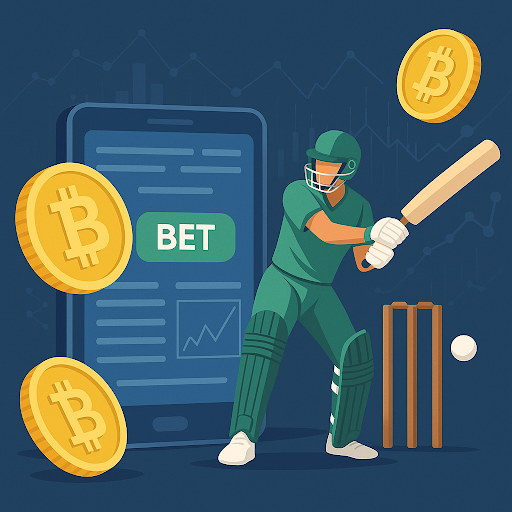Copyright pulsesports

Cricket has always been more than a game — it’s a global economy of fans, data, and passion. Now, cryptocurrency and blockchain are reshaping how that economy functions. From live betting odds to digital assets, the rise of tokenized wagering platforms is creating a new financial layer beneath the sport’s digital surface. Traditional betting systems rely on central intermediaries — operators who control deposits, payouts, and odds. This model works but leaves room for delays, manipulation, and limited access for international users. Crypto betting platforms eliminate those barriers. By using blockchain, transactions become transparent, secure, and nearly instant. The Evolution From Traditional to Tokenized Betting Before cryptocurrency entered the scene, online cricket betting operated through centralized systems. Users deposited money with bookmakers or third-party websites, waited for odds updates, and relied on the platform’s integrity for accurate payouts. The model worked — until it didn’t. Payment delays, withdrawal restrictions, and opaque odds often eroded trust among bettors. To understand how modern solutions are changing the landscape, you can read more about how blockchain-powered cricket platforms are reshaping live betting experiences worldwide. 1. The Shift Toward Decentralization Tokenized betting solves many of these problems. Instead of holding funds in a central account, users wager with digital tokens directly on blockchain-based platforms. Smart contracts automatically execute transactions — no intermediaries, no delays, no disputes. For example, if a user bets on a team to win a live match, the blockchain holds their funds until the game ends. Once the result is confirmed, the smart contract releases winnings instantly and transparently. 2. Global Accessibility Cricket is global, but banking systems are not. In regions where traditional payment gateways are slow or restricted, cryptocurrency provides an open financial bridge. Bettors from India, the UK, or South Africa can join the same decentralized platform using stablecoins or tokens — no exchange rate issues, no credit card limits, and no delays in payout. 3. Real-Time Transparency and Auditability Every transaction on a tokenized platform is recorded on a public ledger. That means bettors can verify payouts, odds adjustments, and total pool sizes in real time. The transparency that blockchain introduces doesn’t just prevent fraud — it builds confidence. 4. Integration With Live Streaming Platforms like DesiPlay Cricket Live show how blockchain and live sports can merge. Bettors can watch a match unfold and place tokenized wagers in sync with real-time data. Smart contracts track the outcome instantly, allowing for frictionless engagement that traditional betting platforms can’t match. Tokenization marks the shift from “trust the system” to “verify it yourself.” That single change — transparency over trust — is what’s driving the future of digital wagering. How Blockchain Technology Powers Secure and Fair Wagering At the heart of tokenized betting is blockchain, the technology that guarantees fairness and removes manipulation. Every transaction, wager, and payout becomes part of a permanent, tamper-proof record. Unlike centralized systems where data sits on private servers, blockchain spreads it across thousands of computers worldwide — making fraud nearly impossible. 1. The Role of Smart Contracts Smart contracts are self-executing agreements stored directly on the blockchain. In digital betting, they handle everything from accepting wagers to releasing payouts once the outcome is verified. Here’s how they change the game: They operate without human involvement, eliminating bias or delay.Terms are visible to everyone, so users know exactly how winnings are calculated.Once triggered, execution is instant and irreversible. This automation not only improves fairness but also makes betting faster and more efficient. 2. Immutable Data and Transparency Each bet placed on a blockchain-based platform becomes a line of code in a public ledger. It can’t be deleted or altered — ever. That permanence ensures total accountability. Players can verify that results, odds, and payouts are accurate by simply reviewing the blockchain records. This level of transparency turns betting into a provably fair system — a concept that traditional bookmakers can’t match. 3. Secure Wallet Integration Instead of storing funds on the platform itself, users hold their assets in crypto wallets. These wallets interact directly with the betting system, meaning users never lose control of their funds. The risk of hacks or frozen withdrawals drops dramatically because no central entity holds the money. 4. Benefits of Blockchain Security in Sports Betting No manipulation or back-end tampering.Instant payouts verified by code, not people.Global, borderless access without middlemen.Auditable results available for everyone to see. Blockchain doesn’t just make betting safer — it redefines what fairness looks like in digital entertainment. Challenges and Future Outlook for Crypto-Based Cricket Betting While tokenized betting promises fairness and speed, it also faces obstacles — both technical and regulatory. For this model to scale globally, the industry must balance innovation with compliance, accessibility, and education. 1. Regulatory Uncertainty Different countries treat cryptocurrency and online betting differently. In some markets, both are legal and thriving; in others, they face restrictions. Platforms must navigate a patchwork of regulations covering financial transactions, anti-money-laundering (AML) protocols, and gaming licenses. Until global standards mature, crypto-based betting will grow unevenly — fast in some regions, cautiously in others. 2. Volatility and Token Stability Cryptocurrencies are known for price swings. If bettors use volatile coins, winnings could change value within minutes. To counter this, many platforms now rely on stablecoins — digital currencies pegged to traditional assets like the U.S. dollar. These reduce financial risk while preserving blockchain’s speed and security. 3. User Education and Adoption Crypto betting introduces new tools — wallets, private keys, smart contracts — that many users don’t yet understand. Without proper onboarding and education, people risk losing funds or falling for scams. Platforms must simplify interfaces and guide users safely through each step of the process. 4. Infrastructure and Speed While blockchain improves transparency, some networks still struggle with scalability. High transaction volume during major cricket matches could cause network congestion. Layer-2 solutions and faster blockchains are already addressing this challenge, but seamless integration remains a technical priority. 5. Future Opportunities Despite the hurdles, the future looks promising. Tokenized ecosystems could soon integrate: NFTs as digital collectibles tied to match moments.Decentralized autonomous organizations (DAOs) for community-driven betting pools.AI-powered odds systems that analyze live data and adjust probabilities automatically. Cricket has always been data-driven, and blockchain perfectly complements that nature. Together, they’re building the foundation of a global, decentralized sports economy. The convergence of cryptocurrency and cricket marks a defining moment for both industries. What began as casual online betting has evolved into a transparent, decentralized ecosystem where users control their funds, verify every transaction, and participate from anywhere in the world. As tokenized systems mature, they’ll push betting toward financial inclusion and digital ownership. Users won’t just place bets — they’ll interact with token economies, own digital collectibles, and participate in data-driven communities that operate without intermediaries. The next phase of cricket betting won’t be defined by who wins on the field but by how technology empowers fans off it. Blockchain, smart contracts, and digital tokens are already setting the pace — and the innings have only just begun.



